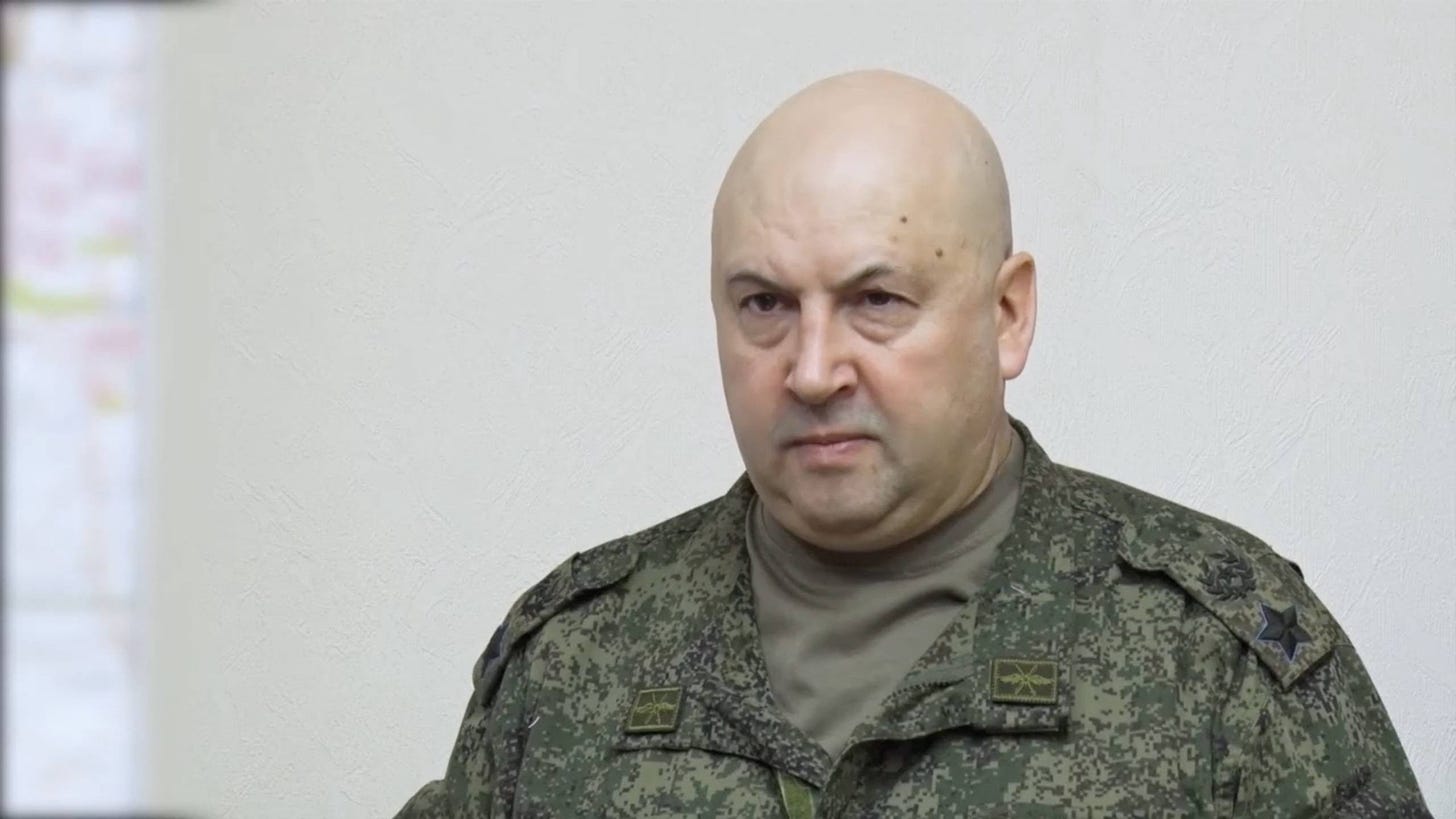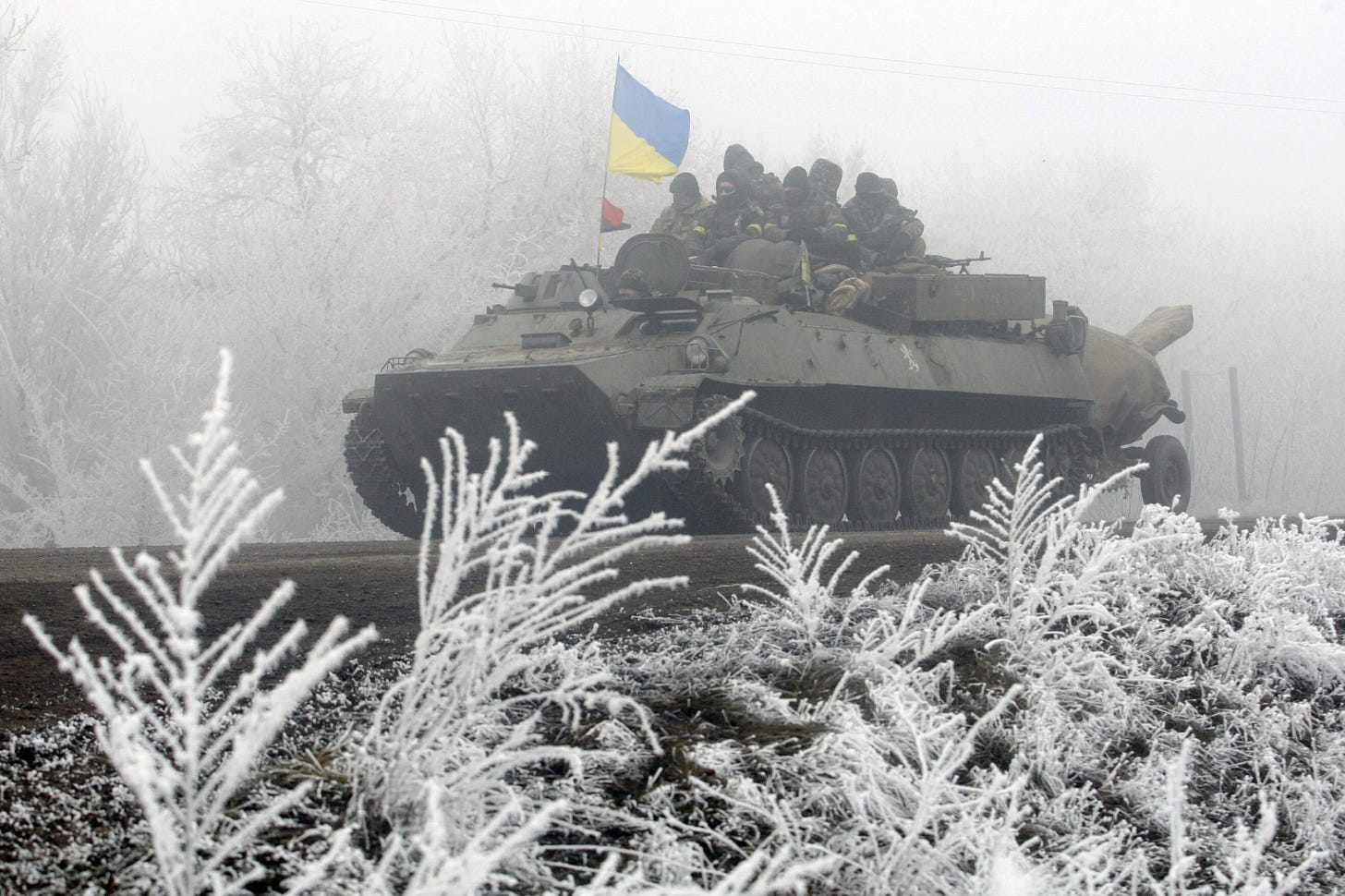General Surovikin: A Different Russian Commander?
Part II of how the new Russian commander may challenge Ukraine’s military strategy
In the first part of this assessment of General Surovikin, I examined the appointment of the new Russian commander, the importance of understanding the enemy, and how he might seek to better align Russian political objectives with its military capacity in Ukraine.
In this second and final part, I explore how General Surovikin might seek sources of advantage in his coming battles against the Ukrainian Armed Forces. Such knowledge should underpin development of Ukrainian defeat mechanisms to ensure Surovikin is unsuccessful.
Finding Asymmetric Advantages Against Ukraine
A second consideration of Surovikin’s moving forward will be his identification and development of asymmetries that he might leverage against the Ukrainians. With his ongoing missile and drone attacks on Ukraine, Surovikin has developed one asymmetric advantage over Ukraine. He can attack the Ukrainians, while for a variety of reasons, the Ukrainians cannot do the same against the Russians.
Where else might the new Russian commander seek capabilities that provide an asymmetric advantage against the Ukrainian Armed Forces? One subject he will explore more is gaining a greater advantage in the air war over and around Ukrainian territory. While an Army man through and through, in 2017, Surovikin was placed in command of the VKS, Russia’s air and space forces. This will have given him a better understanding of the application of airpower than most land commanders, and an appreciation of how they might better contribute to the war.
The conduct of air operations is, unfortunately, an understudied part of the Ukraine war. This has been partially addressed in a very fine, new report that has been produced and published by the Royal United Services Institute (RUSI). Although there is much we do not know, this new report is a comprehensive exploration of the Russian and Ukrainian air war.
One section of the RUSI report points to weaknesses in the Ukrainian air defence system which Surovikin might seek to exploit. The report states that “thanks to its failure to destroy Ukraine’s mobile SAM systems, Russia remains unable to effectively employ the potentially heavy and efficient aerial firepower of its fixed-wing bomber and multi-role fighter fleets to bombard Ukrainian strategic targets and frontline positions.”
The RUSI report also asserts that “if Ukrainian SAMs are not resupplied with ammunition, and ultimately augmented and replaced with Western equivalents over time, the VKS will regain the ability to pose a major threat.” Therefore, the development of air superiority for the Russian aerospace forces over Ukraine may be an area of focus for Surovikin. It would have a significant impact on the war if they could because it would underpin a third potential asymmetry for the Russians: the ability to mass forces.
One of the features of this war is that while it is being fought at an industrial scale, with massive consumption of people, munitions and material, most sections of the 1000-kilometre front line have very thin troop densities. It means that should one side be able to concentrate forces quickly and quietly in any particular location, free from long range air and rocket attack, they may be able to achieve not just a tactical but an operational breakthrough. This is exactly what the Ukrainians did in Kharkiv in September 2022. Thus, a third area where Surovikin might want to generate asymmetry is to use a large, mobilised force to generate concentrations of troops to permit tactical or operational breakthroughs against Ukrainian defences in 2023.
This will not be easy. Regular Russian ground formations have suffered significant attrition, losing many of the competent leaders who might plan and execute such operations. To compound the challenge, individual training for the vast majority of mobilised troops has been poor. This is a bad foundation for the more difficult collective training that is necessary for units and formations to achieve even a basic proficiency in offensive operations. But, with the possibility of more mobilisations and incentives for increased industrial output from the Russians, a shift from the mainly piecemeal attacks by Russians we have seen so far may be an option that Surovikin seriously considers.
With an extensive, meshed sensor network, the Ukrainians have also demonstrated the ability to detect and attack such concentrations at long range. The ‘detection to destruction time’ particularly for high value targets like logistics nodes, command posts and troop concentrations, is around 3-5 minutes in Ukraine. Therefore, the importance of developing a decisive advantage in the air is an obvious area of focus for Surovikin. It would potentially allow him to degrade Ukrainian sensors and long-range strike capability, destroy Ukrainian troop concentrations and protect Russian ground formations in their preparations for, and conduct of, their future offensives.
A final area where Surovikin may make changes to improve his chances of generating ground victories against the Ukrainians is likely to be in his command and control (C2). There are several aspects to this. He will want to improve the integration of combined arms on the ground, as well as air-land integration. These have been weaknesses for the Russians throughout their invasion. There are deep cultural issues at play here, as well as basic problems with leadership and adherence to doctrine. It will not be easy to fix.
At the same time, he may review how his ground forces are allocated to different military districts and combined arms armies. And he might assess whether a different command structure is required for a more effective, centralised application of air power. While it is unlikely that we will witness the kind of air campaign led by the USAF in Iraq and Afghanistan, there is considerable room for improvement in the command and control of air-land operations by Russian forces in Ukraine.
Another aspect of Russian command and control that Surovikin may want to adapt is leadership. Russia has lost many battlefield leaders, from junior to quite senior, in this war. In October, a Newsweek report quoting British intelligence sources described how “Russian military leadership on the battleground is increasingly dysfunctional…Nearly nine months into the invasion of Ukraine, Russian troops on the ground are suffering from a worsening shortage of capable Russian junior officers who are badly needed to organize and lead newly mobilized reservists.”
At the same time, many senior military leaders have been removed from their commands, including at least six generals. Surovikin is sure to be aware of these leadership deficiencies, and the impact it is having on the forces deployed in Ukraine. He will want to ensure his military leaders are capable of leading effectively for the campaigns of 2023.
As a result, there may be more replacements of senior Russian military leaders during the winter in preparation for the Russian operations in 2023. At the same time, General Surovikin is certain to be placing huge pressure on the Russian force generation system back home to produce more junior leaders. However, this will also be a difficult undertaking given the current challenges facing the Russian mobilisation and training system.
Winter is an Opportunity for Surovikin
Winter is an opportunity for Surovikin to consolidate his forces, provide rest, reinforce units and to plan the campaigns that will be conducted in 2023. His ultimate mission from Putin is to secure the remainder of the territory not already seized in the five Ukrainian oblasts annexed by Putin in September.
Despite the great difficulty he may have in mounting such operations, Surovikin will be thinking through his priorities for these offensives to come, their sequencing, where to use experienced units as well as mobilised troops, and the shaping activities that will be needed in advance of 2023 offensives.
As such, it is likely that Ukrainian military success throughout this winter an into 2023 will be partially determined by their ability to out-think the new Russian commander. There will be many other elements of Ukrainian victory – the courage of their military personnel, the support of the Ukrainian people, the material and economic support of the west, and the leadership of President Zelensky. But they must analyse and find ways to defeat the plans of the new Russian commander.
Surovikin, a product of the Russian system and a veteran of exploiting it for his continued promotion, will know that his command is a ‘do or die’ effort. If he succeeds, especially in the face of current doubts about Russia’s ability to win this war, he will be a true hero in Russia. As Mark Galeotti has written, “Surovikin – who, in 2004, upbraided one of his subordinates so severely that he shot himself – may be a potential contender to replace the increasingly-derided General Valery Gerasimov as chief of the General Staff, and so has everything to prove.” The rewards of success will be great indeed.
But, if Surovikin fails, his future is grim indeed. Personally, he has everything to lose, including his life. But, his President equally has much to lose in the event of a Ukrainian victory. It is difficult to see Putin retaining the reins of power if Russian eventually loses this war.
So, the stakes for Surovikin are very high indeed. He will share a common fate with his president should he fail. As such, this makes him a very dangerous foe. Despite Surovikin’s brutal past, it is therefore prudent that we understand him better and not underestimate the impact his leadership might have on Russia’s Ukraine operations.
*****
CAVEAT: This thread is NOT about admiring an enemy military commander who has previously demonstrated brutality towards Syrian civilians, his own soldiers, and now against the Ukrainians. It is designed to provide insights into how to defeat him.
Surovikin mage credit: Japan Times
Aircraft image credit: RUSI
Ukrainian armoured vehicle image: Politico







Very educational and thoughtful. It seems again, that US reluctance to lend- lease F-16’s and train Ukraine pilots is lengthening the war. The idea that President Biden is still intimidated by Russia is frustrating and a failure in leadership in some ways. I say this as someone that was an Elected Biden delegate. I appreacite your consistent Leadership and support of Ukriane Victory.
As a layperson without any military background, I am wondering how Surovikin’s arena makes use of or interacts with cyber warfare activities.